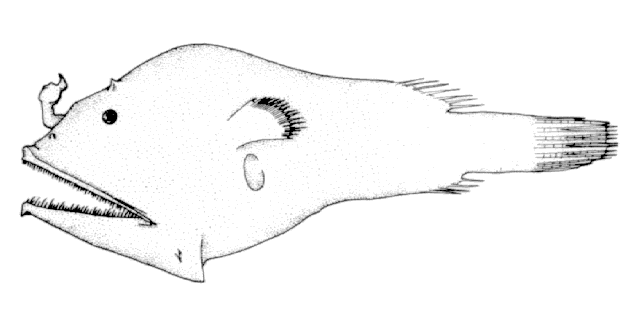| Oneirodidae (Dreamers) |
| 11.8 cm TL (female) |
|
bathypelagic; marine; depth range 800 - 2200 m |
| Tropical and subtropical parts of all oceans. |
|
Dorsal soft rays (total): 5-7; Anal soft rays: 4-6. Metamorphosed females distinguished by the following characteristics: wide ethmoid cartilage and vomer, wider than distance between anterolateral tips of lateral ethmoids and frontals; presence of vomerine teeth; large and nearly circular nasal foramina; frontals short, lying posterior to the ethmoid region, dorsal margin convex; ventromedial extensions of frontals approach each other on midline, making contact with parasphenoid; frontals separated from prootics; presence of pterosphenoid; anterior end of illicial trough wider and shallower than posterior end; well developed sphenotic spines; symphysial cartilage of upper jaw longer than wide; lower jaw with well developed symphisial spine; hyomandibula with double head; well developed quadrate spine, longer than articular spine; deeply notched posterior margin of opercle; short and broad subopercle, dorsal end rounded or tapering to a blunt point, ventral end nearly circular; first pharyngobranchial reduced to a tiny remnant; absence of second hypobranchial; caudal fin rays without internal pigmentation; extremely short illicium, approximately equal to length of escal bulb; pterygiophore of illicium cylindrical throughout, emerging on snout from between frontal bones, anterior end barely exposed, posterior end concealed beneath the skin; first ray of dorsal fin well developed; dorsal fin rays 5-7; anal fin rays 4-6; short and broad pectoral fin lobe, shorter than longest rays of pectoral fin; pectoral fin rays 18-20; coracoid lacking posteroventral process; simple pelvic bones, with or without distal expansion; skin smooth and naked, without dermal spinules; darkly pigmented skin of caudal peduncle extends well past base of caudal fin (Ref. 86949). |
| Also mesopelagic (Ref. 10524). |
|
Least Concern (LC); Date assessed: 09 May 2013 Ref. (130435)
|
| harmless |
Source and more info: www.fishbase.org. For personal, classroom, and other internal use only. Not for publication.
